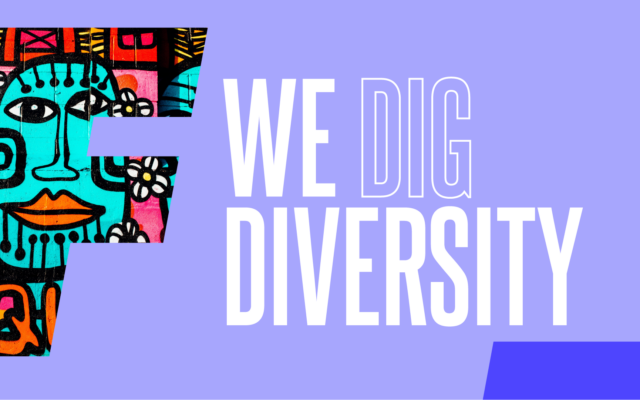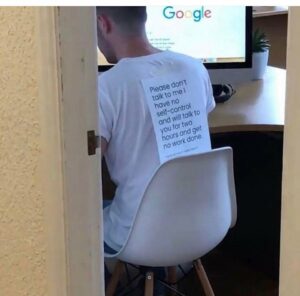Working in PR with ADHD

By Marty Ruczynska
Before we hand over to Marty to share her experience, as an agency we just wanted to take a moment to say how proud we are of Marty and indeed all our team who day in, and day out are navigating challenges that are often not seen. Our industry needs (and indeed thrives) on having different perspectives, different views of the world and people who can challenge what is perceived as ‘the norm’. Marty articulates her experience so brilliantly and she is absolutely right to say her ADHD is a superpower, and we are very glad to have her as our superhero in our midst! Over to Marty!
In true ADHD fashion, this blog is coming to you on the last weekday of Neurodiversity Celebration Week 2023. But, as we are not just for Christmas, this will be relevant and (hopefully) helpful all year round.
I got diagnosed with ADHD in October 2021. Coincidentally, that is also when I joined Fever. How did I get diagnosed, you ask? A friend of mine was talking about her diagnosis and listed out some of her symptoms, all of which seemed like normal behaviour to me, because I had been doing all those things my whole life, too. Turned out, that was very much not the behaviour of someone neuro-typical.
I have been struggling with anxiety ever since I can remember, always feeling an impending sense of doom. I had to be rushed to do my homework, and more often than not, supervised to do it – even when I was a teenager. Turns out, it was probably ADHD this whole time. Women and girls are often diagnosed with it much later in life, usually being treated with anxiety and depression instead. However, later in life, this can manifest as low-self esteem, panic attacks, impulsive spending and even disordered eating.
And speaking of homework, as a child, my mind would always wander off, thinking about the books I could be reading, the friends I could be seeing, the TV shows I could be watching and what my speech would look like if I ever won an Oscar. Or a Grammy. Or a Tony. Or what I would have for dinner. Or how fun it would be to own 101 Dalmatians in real life. I would think about literally anything else, as long as it meant I didn’t have to do said homework.
Having said that, attention deficit, lack of focus and hyperactivity are only the tip of the Attention Deficit Hyperactivity Disorder iceberg. For us, time is a concept. It’s either ‘right now’ or ‘not right now’. We also suffer from executive dysfunction, a condition that disrupts our brain’s ability to control thoughts, emotions and actions. It means we can focus too much on one thing (hello a three-page research paper on the state of cinema in the UK), be distracted by literally anything (we are this meme), daydream and space out more easily than others and often struggle when it comes to switching between tasks – although for me, this is very much situation dependant. We crave stimulation at all times, so jumping between tasks when we choose to do it can be helpful (for example when you’re writing a press release, it can help to stop for a while and focus on something else and come back to it) but when there’s a spanner thrown in the works, it can blow our carefully planned out chaos out of proportion.

One of the symptoms that frustrates me the most is just how much more difficult it is to start tasks I find difficult or boring. In your working life, you are bound to come across things you don’t understand, have never done before, struggle with or simply don’t like doing – and you just have to deal with it! It’s the only way for us to grow and learn. But, try telling your ADHD brain that. It’s difficult for any of us to push through the tasks we dislike, but for those with ADHD, that’s when executive dysfunction really likes to show off. Our brain will block us from retaining the information, from trying to focus and most likely make us start the task at hand seven times more. Imagine getting to a top of a mountain and falling off right as you’re about to reach the top. Now imagine doing that seven times over. Annoying, right? Something I do to help combat this is visualising the end goal and noting down my thoughts as I go, even if they don’t make sense to anyone but me. For example for a press release, the usual structure of Who/What/Why/Where/When doesn’t necessarily work for me. The very first draft is just an info dump. And then I can jump back in and restructure. Another reason why visuals are important to me is that when you have ADHD, the phrase “out of sight, out of mind” is very literal – so it helps to see it all in front of you, and makes it much easier for information to be digested.
Another ADHD symptom that is very crucial at work is time management. As mentioned above, we have a warped sense of time, with a focus on what’s happening right now overshadowing the future. I have learned to adapt and use my calendar and the reminder functions to the best of my ability, but it was much harder than I would have liked it to be. Because of this, we also often over or underestimate just how long something will take. Figuring that out comes with practice. The more I do something the better I am at predicting how long it’ll take me, but it’s always helpful if I’m given a rough idea of how long I should spend on something, especially if it’s a completely new task.
Lastly, let’s talk about Rejection-Sensitive Dysphoria. For us, this means that rejection or any kind of criticism can become so debilitating that it feels like you’ve been punched in the gut. Recognition Sensitive Euphoria on the other hand means that the smallest forms of encouragement and recognition do absolute wonders to motivate us.
I think a big misconception about ADHD comes from it being an invisible illness, but also from the name itself. We don’t have a deficiency of attention, we have an abundance of it. Dr Edward Hallowell, a leading psychiatrist who treats ADHD patients, likened it to having “an amazingly powerful Ferrari engine of a brain with bicycle brakes. So your challenge is to control it.”
We (including myself) need to shift our understanding of it. The conversation around the neurodiversity is great to see, but there is still a lot of work to be done – in particular with women and ethnic minorities. The perception can often be that those with ADHD are lazy, we should just try harder and push ourselves. In reality, we are already doing that. Although my diagnosis came late in life, I’m very glad that it did. It put a lot of things into perspective for me, and I finally felt like life made sense.
Also, some pretty successful people have ADHD: Simon Biles, Emma Watson, Channing Tatum, Dave Ghrol and one of Fever’s favourites, Sam Fender. So perhaps it is a little bit like having a superpower.
Great resources and people to follow to learn more about ADHD:




